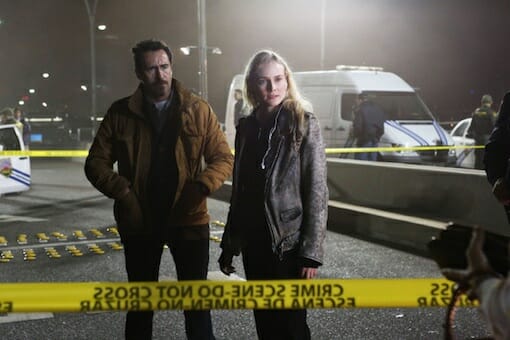By Jim Rohner · July 17, 2013

That the title of The Bridge serves as both a geographic reference point to the titular show's setting between El Paso, Texas and Ciudad Juarez, Mexico and a metaphorical reference point to the confluence of those cities' respective cultures and attitudes toward law enforcement is obvious. In the opening 10 minutes of the show's pilot, all the cards are laid on table as the severed body of a staunchly anti-immigration judge is found dead smack in the middle of the bridge on the United States and Mexico border. How the shadowy figure who was able to take advantage of an electronic pulse that knocked out the bridge's security monitoring is anybody's guess, but to Detective Sonya Cross (Diane Kruger), the question of whose guess is the important one is clear. "She's American. It's ours," she insists to Marco Ruiz (Demian Bichir), the Mexican detective who seems only too pleased to leave it to the Americans so that he can go back to bed.
From the get go, we see their starkly different detective styles: Cross is aloof, intense, procedural, not even allowing an ambulance carrying a heart attack victim and his wife, Charlotte (Annabeth Gish), across the bridge for fear of contaminating the crime scene; Ruiz is silent, observational, seemingly allowing the ambulance to cross because a man who's privy to more than 200 deaths per year recognizes that this one can be saved. Where Cross is naive, Ruiz is experienced. While she has chosen isolation, incongruous in behavior from the rest of her squad, he has been isolated, a good man amongst a force given one choice by the controlling cartel: "take our gold or take our lead."
When it's discovered that the halves of the judge are actually half judge and half teenage girl found dead six blocks away from Ruiz's house, neither officer seems particularly thrilled to have to work together, but for Cross, it's a chance to prove herself to her superior officer and surrogate father, Lieutenant Hank Wade (Ted Levine), and for Ruiz it's a crime that hits close to home for the father of three. It feels almost like cheating that the two are so diametrically the opposite of each other—forced fascination due to violent collision—but there's enough in the pilot in the subtle performances of Kruger, whose defenses drop briefly during a discussion with Levine about his character's retirement, and Bichir, who exceptionally carries the weight of a man balancing loyalty with reality, to elevate their roles above the level of caricature. If you can get around the deliberate pacing of the speak-pause-response-pause dialogue exchanges or Cross's sometimes frustrating and curious black and white viewpoint of law ("People don't like being ratted out." "Then they should follow procedure."), you'll see embodied in the two leads a relationship ripe for and worth developing, representatives of two worlds worth exploring.
But, of course, those two worlds cannot solely be populated by or focused on only two representatives on the same side of the law. Filling out the characters who we'll see play out as yet to be determined parts in this drama are the above mentioned Charlotte, whose wealthy, dying husband leaves her with a confession of unreciprocated love and a key to a cellar containing what we don't yet know; a shady character (Thomas M. Wright), whose motivations for carrying Mexicans across the border in his trunk seem at separate times merciful and horrible; and Daniel Frye (Matthew Lillard), a disgraced newspaperman whose car bookends the episode—crossing the border when it opens and holding him prisoner while wired with a bomb at the end.
It's Frye whose inclusion in the episode and—with a glance at his recurrences on IMDB—in the series that raises the most questions. Though his car retroactively establishes his existence early, his appearance comes well after the 60-minute mark and with no prior mention of his name, the bomb plot, which turns out to be fake, seems only to serve as an opportunity to give an explicit voice to a conflict that the rest of the episode was already skillfully and subtly alluding to: the discrepancy between the U.S. and Mexico in both the number and attention given to yearly homicides. "There are five deaths per year in El Paso," a pre-recorded message rigged up to Frye's bomb declares. "In Juarez, thousands . . . We've got some interesting times ahead. This is only the beginning."
There is a strong hint that the shady character is the serial killer for whom the detectives are looking, and with Charlotte receiving a mysterious, Spanish-language phone call shortly after her husband's death, the detectives and Charlotte’s connection to the larger themes of The Bridge seem clear if not implied. Frye remains the loose thread in what is otherwise a solid introduction to the world we'll be exploring for the next 11 episodes.